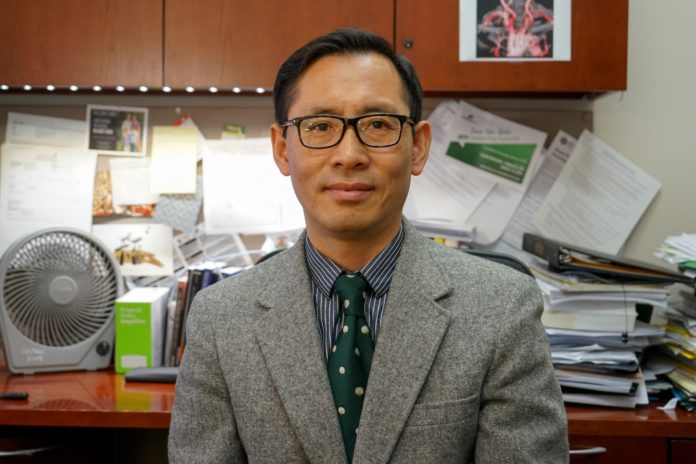
By Savannah Cooper | Reporter
Full immersive exposure on a consistent basis is a strongly advised method for those learning a second language. Starting in spring of 2013, the Department of Communication Sciences and Disorders started to host a volunteer partnership program that provides customary help to international student researchers and faculty members.
The Conversational English Partner program is a service-based community where undergraduate tutors, specifically junior and senior communication sciences and disorders majors, meet with international student scholars and/or faculty members on a weekly basis.
Communications sciences and disorders associate professor and associate chair Dr. Jungjun Park doesn’t like to refer himself as a director due to its implications that stray away from the program’s original mission of authentic language immersion.
“The most important goal was to provide any kind of language immersion situation for them to come in this English-based interaction,” Park said. “It’s not really a classroom interaction, you don’t really learn any grammar. It’s about exposing yourself to these really English-based learning interactions as much as possible, so that you experience stable acculturation for the best academic outcomes.”
At the start of each semester, the program begins with an initial diagnostic as well as a request for what each student would like to work on. The diagnostic measures three levels of competency: cultural, linguistic and speech which are measured at the beginning and end of the semester to track progress.
After tutors are assigned to their student, they meet at least once a week in a location of their choice discussing a variety of topics and practicing specific areas of speech all while building cross-cultural friendships.
Once international scholars are accustomed to their lives at Baylor, it is very easy for them to isolate themselves within their research laboratories, Park said he wants those who fall victim to that to come out of their comfort zone and aims to bridge such a gap with this program.
“Typically I assume that when you are a doctoral student working for any kind of research, you’ll be basically confined in the research settings such as library, office, or lab expect for your lunchtime,” Park said. “It’s kind of funny that you would be spending that type of lifestyle for the next five years, and if you happen to go to social meetings that are rooted in your home language or culture Chinese church on top of that, you are literally isolated from cultural and linguistic stimulations that are crucially important for your best outcomes.”
Electrical and computer engineering Associate Professor Dr. Liang Dong’s colleagues introduced him to this program, and he saw it as a good opportunity to improve his speaking ability particularly with small words in regular, conversational sentences.
“I thought to myself my ‘English speaking is not enough and clear enough,’ and she (his tutor) corrected a lot of my pronunciation,” Dong said. “For example, the word ‘put’ I usually want to pronounce it out, but I was corrected. Just a little thing like that made me aware that there are a lot of things that need to be improved in my speech.”
As a researcher, Dong knows how easy it is for scholars to be working alone or surrounded by other international students in a lab setting where little to no speaking is needed.
“We don’t have an environment that requires us to speak for a long time,” Dong said.
Reciting short YouTube clips like Angela Lee Duckworth’s Ted Talk on Grit or asking to hear a planned upcoming lecture to give third party feedback are ways tutors challenge their students making them better speakers overall.
After just a few sessions, Dong felt a shift in his English thanks to the newfound confidence the informal, catered sessions provided.
“It made me more confident speaking slowly trying to speak out every word,” Dong said. “The biggest focus was to read out each sentence clearly and slowly.”
For those who are looking to improve their speaking skills, Dong suggests that you bravely reach out to your American neighbors.
“Americans have a very open society,” Dong said. “It would help themselves a lot if they were brave enough to reach out in their environment. Especially here in Texas, people are very friendly. Once you make friends with a Texan you’ll become very good friends. My advice to them is to be open hearted and to reach out and befriend others.”
Park is confident in Baylor’s potential in becoming a campus that’s supportive of international student researchers due to the core values this institution was built on.
“Baylor has exceptional potential to fulfill that mission because this campus is packed with people of genuine love and a service mind,” Park said. “To fully accomplish Baylor’s passion for top-notch global research, I believe that this is the great time to develop new support systems to reach in to the current and prospective international student researchers.”
If you’re interested in volunteering, email jungjun_park@baylor.edu.





